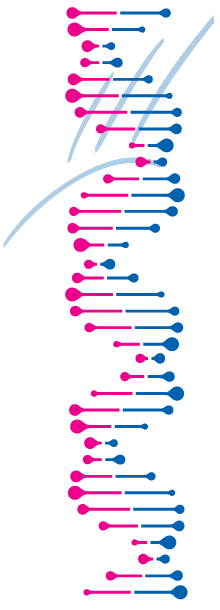
Mycoplasma Bovis

MYCOPLASMA BOVIS HERD SPECIFIC SOLUTIONS.
Genova Labs has been an industry leader in understanding the complexities of Mycoplasma bovis. Gene Insertion Sequencing data on over 150 Mycoplasma bovis isolates from U.S. calf ranches and feedlots was initially done by Dr. Fiona Maunsell and Dr. Mary Brown of the University of Florida, Gainesville. The isolates were supplied by customers of Genova Labs. It was the first time that U.S. isolates of M. bovis had been sequenced with the ISMbov2 and ISMbov3 probes. This original data was presented at the International Organization of Mycoplasmology conference in July 2006 at Cambridge, UK and updated at the International Conference on Bovine Mycoplasmosis in Saskatoon, Canada in July 2009. Dr. Maunsell presented this analysis at the Academy of Veterinary Consultants conference in Colorado Springs, CO in August 2009. Our work continues with Whole Genome Sequencing and IS typing of M. bovis strains that have been isolated from herds with recurring Mycoplasma issues. Genova Labs can work with you to genetically identify these ever-varying and adapting strains that cause problems in your herd. For more details, contact Melanie Huhta, President.
MYCOPLASMA BOVIS – FREQUENTLY ASKED QUESTIONS
When should I suspect Mycoplasma bovis infections?
In dairy cattle, it is commonly identified in cases with animals exhibiting mastitis, severe respiratory problems, and swollen joints. In young calves, it is especially common with tilted heads from ear infections. In beef cattle, it is most commonly associated with swollen joints and severe respiratory problems.
Is Mycoplasma bovis the only type of Mycoplasma found in cattle?
No, there are several different species of Mycoplasma which have been isolated in cattle. Mycoplasma bovis is one of the most common species found in diagnostic workups of sick and dead animals and has been proven in challenge studies to cause clinical disease.
Are there different types of Mycoplasma bovis?
Yes. Mycoplasma bovis is highly mutable with multiple insertion sequences (IS). Genova Labs leads the industry in understanding M. bovis complexities and how IS mobilization contributes to plasticity and diversification of the genome. With IS & MLST typing of M. bovis we can help you select isolates from the strains that may be causing problems in your herd and develop a custom vaccine for you.
Are all strains of Mycoplasma bovis pathogenic?
At this time, not enough research has been done to verify the pathogenicity of several of the strains. We do know that M. bovis isolates found in the lungs, joints, lymph nodes, or ears of the same animal are typically the same strain. While other Mycoplasma species found most often in the nasal passages are seldom found in the lungs. This may be an indication that those Mycoplasma species isolated in the nasal passage are less pathogenic.
Is M. bovis isolated from nasal passages thought to be pathogenic in the lungs?
It is common to find these organisms present in the nasal passages. We believe the chances of isolating a good candidate for an autogenous vaccine are lower when isolated from nasal swabs. If the M. bovis isolates are from lung lesions, you know they are pathogenic. However, if nasal swabs are the only means available to obtain a sample, we suggest using them rather than waiting until a lung sample can be taken. If you have submitted nasal swabs to your diagnostic lab, and then obtain lung, ear, or joint samples, we recommend comparing them with the strains from the nasal swabs.
What area of the body in cattle is it best to take a sample?
M. bovis has been isolated from lungs, lymph nodes, ear swabs, joint fluid, eye swabs, and nasal swabs. For respiratory problems in the feedlot, the lung is the best place to get a sample. If there are no dead animals from which a lung sample can be taken, it is possible to get an isolate from a tracheal wash. If the animals are exhibiting lameness and swollen joints, then it is best to extract some fluid from the joint area for the sample. In dairy calves, it is common to see tilted heads from ear infections. In this case, the sample should be taken from behind the eardrum. Nasal swabs can be used in respiratory cases, but it is best to submit a lung sample if at all possible.
What diagnostic labs are isolating Mycoplasma bovis?
Most of the state labs are currently culturing and identifying Mycoplasma bovis because of the increased awareness of mycoplasma problems. Genova customers have sent samples to state diagnostic labs in Arizona, California, Florida, Idaho, Indiana, Iowa, Kansas, Nebraska, Texas, and Washington. Genova Labs is not in the diagnostic laboratory business. In the last several years, more and more state laboratories are adding Mycoplasma tests.
Should I look for any other pathogens besides Mycoplasma bovis?
Yes. Your diagnostic lab should also screen for other bacterial pathogens such as Histophilus somni, Mannheimia haemolytica, and Pasteurella multocida, as well as other types of Mycoplasma. If isolated, these pathogens are often added to the vaccination program.
Is a custom made autogenous Mycoplasma bovis vaccine a live product or a killed vaccine?
Genova Labs’ autogenous Mycoplasma vaccines are inactivated or killed vaccine. All autogenous products are killed products as required by USDA. All autogenous vaccines we sell are contract manufactured for Genova Labs in compliance with the laws and guidelines set by USDA.
What is the dosage size?
The size of the dose ranges from 2 ml to 5 ml depending upon the number of Mycoplasma isolates used in the autogenous vaccine.
How many doses do I need to give?
The standard recommendation is 2 doses administered 14-21 days apart. In order to provide optimum protection, the first dose should be administered 4-6 weeks prior to onset of clinical signs in the herd. For young dairy calves in co-mingled situations, some calf ranches are giving 3 doses with the first dose given at 1-7 days of age, with a second dose at 21 days, and the third dose at approximately 45 days of age.
Will using a custom made autogenous Mycoplasma bovis vaccine solve my problem?
Experience has shown that an autogenous Mycoplasma bovis vaccine significantly reduces clinical symptoms and mortality caused by the disease. It has also been noted by our customers that vaccinated animals respond better to treatment if they do become sick, especially in situations with respiratory involvement. In many cases these animals have undergone severe stress from weaning, handling, and transportation and their immune systems are compromised. So other pathogens, in addition to Mycoplasma bovis, may be affecting the animal. An autogenous Mycoplasma bovis vaccine is another tool for you to use to help protect animals at risk.
How is Genova Labs' autogenous Mycoplasma bovis vaccine different from 'other companies'?
The federal licensed products contain only 1-3 strains of Mycoplasma bovis. It is well documented that additional strains are causing disease and it is evident from reports of lack of protection from these products that there is little or no cross protection between strains. Vaccines made from multiple isolates afford your animals the best protection against Mycoplasma bovis.
